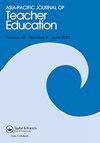庆祝APJTE成立50周年:回顾过去、现在和未来
IF 1.6
3区 教育学
Q2 EDUCATION & EDUCATIONAL RESEARCH
引用次数: 0
摘要
今年是《亚太教师教育杂志》创刊50周年。我们,杂志的编辑们,希望通过在我们全年的社论中组织一些专题来庆祝这一里程碑式的一年。除了介绍每期的常规文章外,我们还将邀请一些人来谈谈今天教师教育领域的承诺和挑战,他们可以帮助我们反思这个领域的起源和在不久的将来应该走向何方,他们可以帮助我们通过跨文化和跨国对话来想象教师教育和研究的不同之处。在过去的几年里,我们作为编辑一直在努力实现的一件事是加强杂志与其赞助协会——澳大利亚教师教育协会(ATEA)之间的联系。去年,我们在ATEA会议上组织了两次会议;一场是我们邀请了期刊的一些顾问委员会成员参与我们的八大挑战(见Biesta, Takayama, Kettle, & Heimans, 2020),另一场是举办了一个关于期刊的信息会议,为ATEA的早期职业研究人员提供一些关于如何发表论文的建议。此外,我们中有一人定期参加ATEA执行会议,以了解他们的讨论情况。虽然APJTE不是ATEA成员的专属,但APJTE为ATEA的利益服务并积极倡导行业是至关重要的。作为促进这一联系的持续努力的一部分,我们邀请了2021年ATEA年会的四位主题演讲者参加我们的庆祝活动。我们要求他们要么根据主题演讲准备一份手稿,要么接受我们的采访。Jo-Anne Reid(澳大利亚查尔斯·斯图尔特大学)和Graeme Hall(澳大利亚教学和学校领导研究所)准备了一份手稿,包括在本期中,而其他三位主讲人选择以采访的形式回答我们的问题,本期还包括对加拿大不列颠哥伦比亚大学的Anne Phelan的采访。对Ken Zeichner(美国华盛顿大学)和Marnee Shay(澳大利亚昆士兰大学)的采访将在后续刊物中发表。在《回顾过去,展望未来:在(另一个)十字路口评估教师教育》一书中,与澳大利亚教师教育协会合作多年的两位资深教师教育家Jo-Anne Reid和Graeme Hall向我们介绍了澳大利亚教师教育协会的历史,以及澳大利亚教师教育协会在帮助提高教师教育作为大学内一门适当学科的合法性和支持教师专业化方面所发挥的关键作用。在澳大利亚,就像其他地方一样,教师教育领域一直受到学术界内外的攻击。那些要求适当承认教师教育的人所采用的关键策略之一是建立该领域的知识库,教师可以在此基础上发表他们的《亚太教师教育杂志2022》(ASIA-PACIFIC JOURNAL of teacher education 2022, VOL. 50, NO. 5)。1,1 - 7 https://doi.org/10.1080/1359866X.2022.2022854本文章由计算机程序翻译,如有差异,请以英文原文为准。
Celebrating the 50th anniversary of APJTE: a reflection on the past, present and future
This year marks the 50 anniversary of the Asia-Pacific Journal of Teacher Education (APJTE). We, the editors of the journal, would like to celebrate the milestone year by organising a number of special features in our editorials throughout the year. In addition to introducing the regular articles included in each issue, we are going to invite a number of people who can speak to the promises and challenges for the field of teacher education today, who can help us reflect upon where the field has come from and where it should be headed to in the near future, and who can help us imagine teacher education and research differently through cross-cultural and cross-national dialogues. One thing that we have been trying to achieve in our editorial role over the last few years is to strengthen the linkage between the journal and its sponsoring association, the Australian Teacher Education Association (ATEA). Last year, we organised two sessions at the ATEA conference; the one where we invited some of the journal’s advisory board members to engage with our eight challenges (see Biesta, Takayama, Kettle, & Heimans, 2020), and the other where an information session about the journal was held to offer ATEA’s early career researchers some tips on how to get published. Besides, one of us regularly attends the ATEA executive meetings to stay informed of their discussions. Though APJTE is not exclusive to ATEA members, it is vitally important that APJTE serves the interests of ATEA and actively advocate for the profession. As part of this ongoing effort to facilitate the linkage, we invited the four keynote speakers at the 2021 ATEA annual conference to be part of our celebration. We asked them to either prepare a manuscript based on their keynote speeches or to be interviewed by us. Jo-Anne Reid (Charles Stuart University, Australia) and Graeme Hall (Australian Institute for Teaching and School Leadership) prepared a manuscript, which is included in this issue, while the other three keynote speakers opted to answer our questions in an interview format, and this issue includes an interview with Anne Phelan from the University of British Columbia, Canada. The interviews with Ken Zeichner (University of Washington, USA) and Marnee Shay (University of Queensland, Australia) will be published in the subsequent issues. In Looking back, looking forward: Taking stock of teacher education at (another) crossroad, Jo-Anne Reid and Graeme Hall, the two veteran Australian teacher educators who have been associated with ATEA for many years, offer us a rare glimpse into the history of ATEA and the crucial roles that APJTE has played in helping to enhance the legitimacy of teacher education as a proper discipline within the university and supporting the professionalisation of teachers. In Australia, just as elsewhere, the field of teacher education has been under consistent attack both from within and outside academia. One of the key strategies employed by those who demand proper recognition of teacher education has been to establish the knowledge base of the field upon which teachers can claim their ASIA-PACIFIC JOURNAL OF TEACHER EDUCATION 2022, VOL. 50, NO. 1, 1–7 https://doi.org/10.1080/1359866X.2022.2022854
求助全文
通过发布文献求助,成功后即可免费获取论文全文。
去求助
来源期刊

Asia-Pacific Journal of Teacher Education
EDUCATION & EDUCATIONAL RESEARCH-
CiteScore
4.40
自引率
7.70%
发文量
29
期刊介绍:
This journal promotes rigorous research that makes a significant contribution to advancing knowledge in teacher education across early childhood, primary, secondary, vocational education and training, and higher education. The journal editors invite for peer review theoretically informed papers - including, but not limited to, empirically grounded research - which focus on significant issues relevant to an international audience in regards to: Teacher education (including initial teacher education and ongoing professional education) of teachers internationally; The cultural, economic, political, social and/or technological dimensions and contexts of teacher education; Change, stability, reform and resistance in (and relating to) teacher education; Improving the quality and impact of research in teacher education.
 求助内容:
求助内容: 应助结果提醒方式:
应助结果提醒方式:


